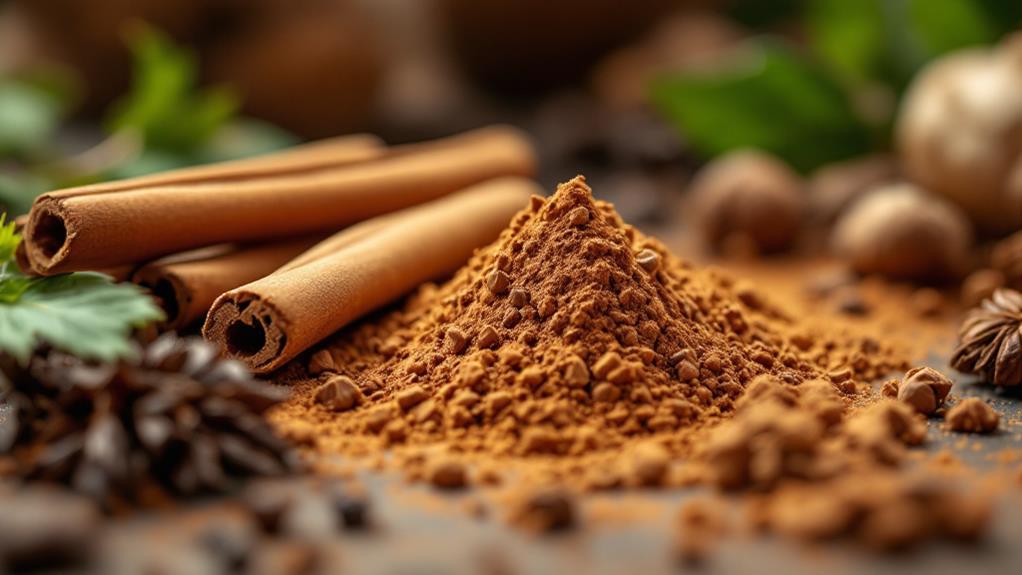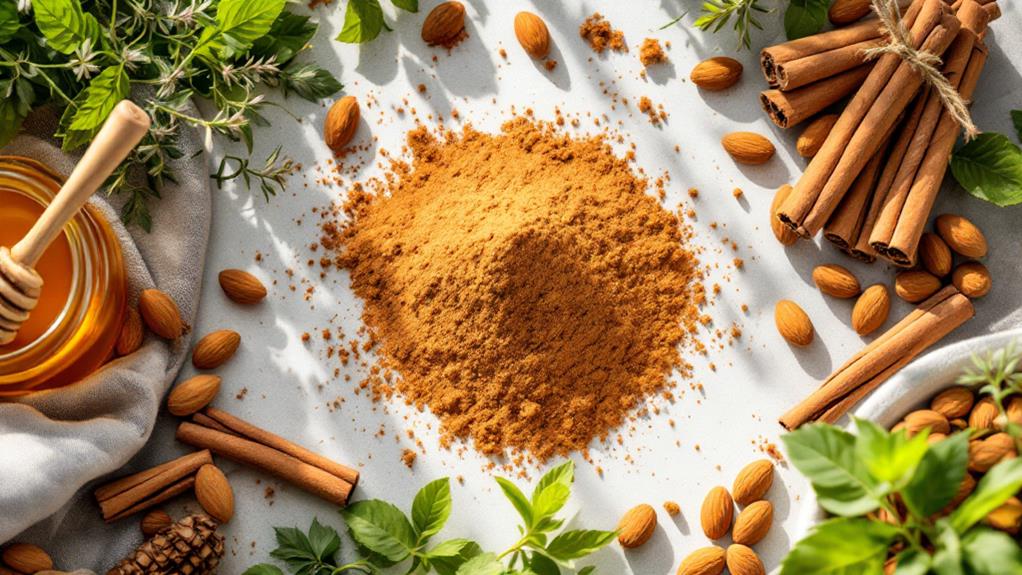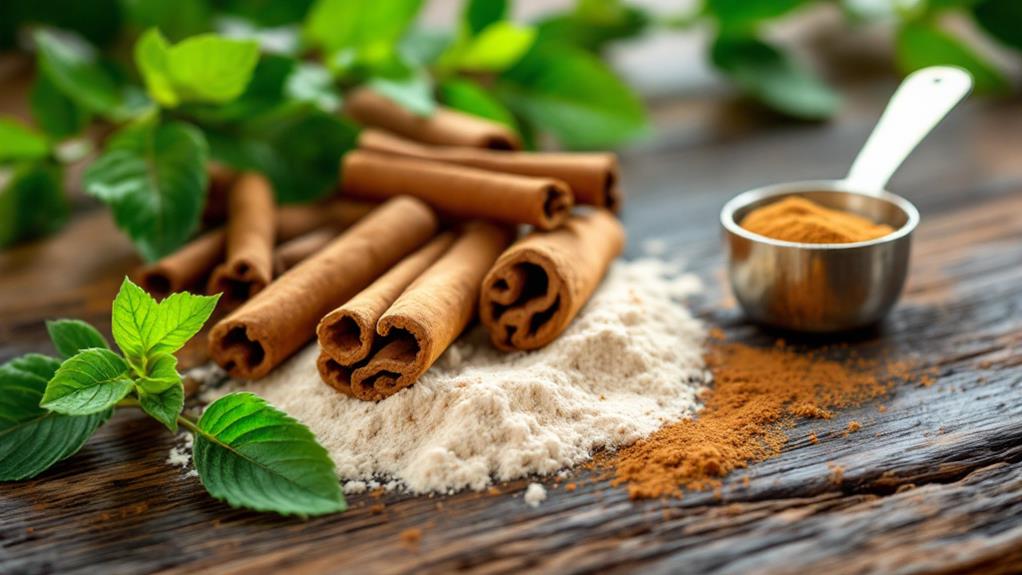Everything About Cinnamon: Health Benefits and Culinary Uses

You'll find that cinnamon isn't just a delicious enhancement to your recipes; it offers tremendous health benefits too. This spice helps regulate blood sugar, enhances cardiovascular health, and provides antimicrobial effects. It's loaded with antioxidants, which can even improve cognitive function. Regardless of seasoning curries, sweetening your oatmeal, or sprucing up your smoothies, cinnamon's versatile nature makes it a kitchen staple. It's essential to choose Ceylon cinnamon for regular use due to its lower coumarin content. Just remember, moderation is key as high doses can be harmful. There's so much more to uncover about this amazing spice.
Understanding Cinnamon
Cinnamon, a popular spice cherished around the globe, comes from the inner bark of small evergreen trees, mainly from the Cinnamomum genus. You'll find two main types: Ceylon, known as true cinnamon, and Cassia. While Ceylon is more expensive, it's favored for having lower coumarin levels, making it a healthier option. Both types, though, share impressive health benefits and culinary applications.
In terms of health benefits, cinnamon is packed with antioxidants, which help combat oxidative stress in your body. Its anti-inflammatory properties can reduce swelling and pain. Consuming cinnamon might also aid in regulating blood sugar levels, a boon for those managing diabetes. Moreover, cinnamon supports cardiovascular health by potentially lowering cholesterol and blood pressure.
Cinnamon isn't just a health powerhouse; it's also a versatile ingredient in the kitchen. It boosts the flavor of both sweet and savory dishes, making it a staple in recipes like oatmeal, curries, and desserts. Furthermore, it provides trace nutrients such as calcium, iron, and magnesium, although these are present in small amounts. Understanding cinnamon's benefits and uses can transform how you approach both health and cooking.
Nutritional Highlights
Beyond its flavorful and medicinal properties, let's investigate the nutritional profile of this remarkable spice. Cinnamon stands out as a low-calorie spice, providing just 7 kcal per teaspoon (3g), making it an excellent option for enhancing your dishes without adding extra calories. It consists of 2g of carbohydrates and impressively offers 1.6g of dietary fiber per teaspoon, supporting digestive health and keeping you feeling fuller longer.
Cinnamon isn't just about flavor; it is a source of vital nutrients too. You'll find traces of calcium, iron, magnesium, phosphorus, and potassium in it, along with vitamins B and K. These nutrients contribute to your comprehensive well-being and complement the spice's culinary uses. The antioxidants in cinnamon, particularly polyphenols, further elevate its profile by helping combat oxidative stress in your body, adding to the health benefits it provides.
When considering the two main types of cinnamon, Ceylon and Cassia, it is important to recognize the difference in coumarin content. Ceylon cinnamon contains considerably lower levels, making it a safer choice for regular consumption. Incorporate cinnamon in your diet and enjoy its impressive array of nutritional highlights.
Health Benefits

Among the array of benefits cinnamon offers, its rich composition of antioxidants and polyphenols stands out, helping combat oxidative stress and potentially lowering the risk of chronic diseases. If you're looking to improve your health, cinnamon might be a great supplement to your routine. Let's break down the health benefits:
- Reduce Blood Sugar: Cinnamon has been shown to improve blood sugar regulation. Its ability to increase insulin sensitivity can be particularly beneficial for those with type 2 diabetes, helping reduce fasting blood sugar levels.
- Anti-inflammatory Properties: This spice is known for its anti-inflammatory effects, which may ease symptoms of inflammatory conditions such as arthritis. It can help lower inflammation markers in your body.
- Antimicrobial Properties: Thanks to cinnamaldehyde, cinnamon can inhibit the growth of harmful bacteria and fungi. This supports oral health and maintains food safety.
- Cognitive Function: There's evidence that cinnamon may improve cognitive function and protect against neurodegenerative diseases. Its compounds might inhibit protein accumulations linked to Alzheimer's disease.
Incorporating cinnamon into your lifestyle can offer these health benefits, contributing to comprehensive well-being and potentially improving your quality of life.
Culinary Applications
Sprinkling a little magic into your dishes, cinnamon transforms both sweet and savory recipes with its warm, aromatic flavor. As a versatile culinary spice, cinnamon can improve a variety of dishes, making it a favorite in kitchens worldwide. In sweet dishes, it's common to sprinkle cinnamon on oatmeal or mix it into baked goods like cinnamon rolls and cookies. For an extra burst of flavor, add it to smoothies. Cinnamon pairs beautifully with fruits such as apples and bananas, starring in desserts like apple pie or banana bread where its warmth perfectly complements the fruit's natural sweetness.
In savory dishes, cinnamon adds depth and complexity, making it a key ingredient in many global cuisines. It enriches the flavor profile of curries and stews, offering a subtle warmth that raises the dish. Popular recipes like Keralan chicken curry and butternut squash soup showcase cinnamon's ability to adapt to different culinary styles. Even a Moroccan orange dessert salad can benefit from its unique touch, demonstrating its wide-ranging capabilities. With its ability to improve both sweet and savory dishes, cinnamon proves to be a truly indispensable culinary spice in any kitchen.
Safety Considerations

When enjoying the delightful taste of cinnamon, it is crucial to be mindful of its safety considerations. While cinnamon offers numerous health benefits, consuming it in high doses can pose risks. Here's what you should know:
- Moderate Amounts vs. High Doses: Cinnamon is generally safe in moderate amounts. However, high doses, especially of Cassia cinnamon, can lead to toxicity due to coumarin, a compound that may cause liver damage. Aim to keep your daily intake below 0.1 mg/kg of body weight to avoid side effects like gastrointestinal distress and headaches.
- Choosing Ceylon Cinnamon: For regular consumption, opt for Ceylon cinnamon. It contains considerably lower levels of coumarin compared to Cassia, making it a safer choice for your health.
- Medication Interactions: If you're on anticoagulants or managing diabetes, be cautious. Cinnamon can interact with medications, potentially lowering blood sugar levels excessively. Always consult healthcare providers before increasing your cinnamon intake.
- Recognizing Side Effects: Stay alert for any adverse reactions like allergic symptoms or nausea. These are common side effects of consuming too much cinnamon.
Research and Studies
Recent research has clarified the promising health benefits of cinnamon, particularly in glycemic control and cholesterol management. Numerous studies suggest that cinnamon supplementation can considerably reduce blood sugar levels, making it a valuable enhancement for those dealing with insulin resistance. For instance, research published in Diabetes Care found that taking 1-6 grams of cinnamon daily might effectively lower blood sugar in individuals with type 2 diabetes, also showing improvements in hemoglobin A1c metrics.
A systematic review further emphasizes cinnamon's positive impact on cholesterol levels. Regular consumption can reduce total cholesterol and LDL levels while increasing HDL cholesterol, contributing to a healthier lipid profile. This makes cinnamon not only a spice but also a potential ally in cardiovascular health.
Besides its benefits for blood sugar and cholesterol, animal studies have suggested cinnamon's neuroprotective effects. Compounds in cinnamon might inhibit tau protein accumulation, linked to neurodegenerative diseases like Alzheimer's. However, current investigations are ongoing to establish the ideal dosages and long-term impacts of cinnamon consumption. More randomized controlled trials are needed to validate these health benefits fully, ensuring that cinnamon's potential is both safe and effective for everyday use.




